As has been mentioned repeatedly here on SSP, Virginia redistricting will apparently be done through a deal where in exchange for an incumbent protection map for an 8-3 in-favor-of-Republicans Congressional delegation and allowing the GOP-led House of Delegates (HoD) to draw its own map, the Democratic State Senate will get to draw its own map to protect its slight 22-18 advantage. While the circumstances of this deal may change if the Department of Justice does indeed force Virginia to have a second minority-majority district (read: African-American) in the southeast part of the state, for the time being this deal is the basis for redistricting.
Due to the off-year nature of elections in Virginia, it is more difficult to predict turnout and momentum, particularly with the 2011 election coming up in November affecting all 40 Senate seats and the 100 seats in the HoD. While the 2009 election had the governor’s race at the top of the ticket, it did not impact the State Senate because its seats are elected in non-gubernatorial years. Considering the disastrous performance of the Democratic candidates on top of the ticket which contributed to the loss of five Democratic seats in the HoD, we can be thankful that this is the case. Otherwise, the GOP would likely have taken control of the State Senate in addition to the governorship and thus controlled the entire redistricting process.
With all of this in mind, I have been formulating a State Senate map that both protects the Democratic majority and gives it a chance to increase its lead given the right circumstances. In doing so, I’ve attempted to not draw GOP incumbents out of their districts because of how this would likely engender resentment and could upset the redistricting deal. I’ve also tried to draw realistic districts though my map is certainly a gerrymander – however, based on the previous State Senate map, I don’t think it’s any worse in terms of compactness or ignoring communities of common interest. Additionally, I preserved all black majority-minority districts in the Tidewater and around Richmond, as well as the same number of white plurality districts in Northern Virginia (NoVA). In reviewing the new districts I drew, I will refer to their old Dem-GOP and Obama-McCain numbers based on an attempted sketch that I made of the current districts on Dave’s Redistricting App. I have also kept every district’s population total inside of 1,000 from the ideal number. The final result of my efforts is this map, which creates a good chance for a 24-16 Democratic edge after 2011 (if everything goes according to plan):
Unfortunately, I couldn’t manage to draw my home town of Harrisonburg into a Democratic district, but you can’t win them all. Anyway, details on my map are after the jump.
We’ll begin with the districts from the western side of Virginia. Here’s a map that stretches from Southwest Virginia (SWVA) north into the Shenandoah Valley and east into what is known as Southside Virginia. I’ll discuss districts 40, 38, 22, 21, 19, and 23 here.
VA-40 (Brown) – GOP Incumbent, Safe GOP
In its current form, this district is one of the most Republican districts in Virginia. However, on my map it is now the most GOP-heavy based on 2008 numbers. This ought to please William Wampler, Jr., who represents this district.
Before – Dem average: 38.1%, Obama: 33.2%
After – Dem average 37.1%, Obama 32.9%, Race: 94.2% W, 2.4% B, 2% H
VA-38 (Aquamarine or Light Blue) – DEM Incumbent, Likely DEM with Incumbent and Likely GOP otherwise
The Democratic representation in this district is a holdover from the days when coal unions still held more power and plenty of Southern and Appalachian Democrats were still consistent voters for the party. Phil Puckett, the incumbent here, took office in 198 and went unopposed in 2007. He ran unsuccessfully for the Lieutenant Governor’s nomination in 2005. As a conservative Democrat who Johnny Longtorso compared in his recent diary on the State Senate to Bobby Bright, Puckett is the only kind of Dem who can hold this district. Luckily, he’s only 63 and could probably hold this district for a while longer. I am confident that the day he retires, the district will fall into Republican hands. For that reason and the fact that there weren’t exactly many Democratic areas to extend the district into, I didn’t really alter the complexion of the district very much. We can see the 2008 shift in Appalachian voters in the numbers:
Before – Dem avg.: 46.5%, Obama: 39.8%
After – Dem avg.: 46.7%, Obama: 39.5%, Race: 93.7% W, 3.7% B, 1% H
VA-22 (Navy Blue) – GOP Incumbent, Safe GOP
This district was extended down into the southwest some while losing Radford, a town with college students in it and therefore more blue. However, everything else about this district is red except the color I gave it on the map. It incorporates the city of Salem which is famous for its appearance in the movie Borat where he’s at the rodeo and sings the national anthem incorrectly. Yeah, it’s a conservative area. Its northeastern edge contains half of Botetourt County, which is where the incumbent, Ralph K. Smith, lives. Hopefully, he lives in the western half of the county that’s still in this district.
Before – Dem avg.: 40.2%, Obama: 39.1%
After – Dem avg.: 39.7%, Obama: 37.9%, Race: 91.7%, 3.7% B, 1.7% H, 1.4% A
VA-21 (Chocolate) – DEM Incumbent, Lean/Likely DEM
Originally, I extended Phil Puckett’s district over to Radford to attempt to pick up more Dem voters. However, I realized that was something of a dummymander so instead I included Radford in the new VA-21 which joins the other college town of Blacksburg, where Virginia Tech is located, in the southern part of the district. The most important Dem source of votes is the city of Roanoke, which is entirely in this district, and is the largest city in western Virginia, and is where incumbent John Edwards lives.
Before – Dem avg.: 54.2%, Obama: 56.2%
After – Dem avg.: 54.7%, Obama: 57.4%, Race: 74% W, 15.9% B, 4.1% H, 3.7% A
VA-23 (Teal) – GOP Incumbent, Safe GOP
This district was mostly unaltered, though it became slightly more Democratic. However, it is still solidly red for incumbent Steve Newman. It’s home of Lynchburg, where Liberty University is, so I guess that’s appropriate.
Before – Dem avg.: 38.1%, Obama: 37%
After – Dem avg.: 40.9%, Obama: 39.3%, Race: 78.8% W, 15.7% B, 2.1% H, 1.4% A
VA-19 (Lime Green) – GOP Incumbent, Safe GOP
Fresh incumbent William Stanley took over this district after Robert Hurt defeated Congressman Tom Perriello in the 2010 election for the Virginia 5th Congressional District. However, the 19th has been greatly altered, losing all of Danville and part of Pittsylvania County while adding the rest of Campbell County and parts of Carroll, Floyd, Henry, and all of Patrick counties. What’s left is a redder district:
Before – Dem avg.: 41.3%, Obama: 41.6%
After – Dem avg.: 36.6%, Obama: 34.1%, Race: 85.2% W, 10.5% B, 2.2% H
Sticking with the Southside area, we’ll move along the southern border of the state towards Richmond and the Tidewater. Here’s a picture of the area, and I will talk about districts 20 and 15:
VA-20 (Gray) – Dem Incumbent, Safe DEM with Incumbent, Lean DEM/Toss-up otherwise
Roscoe Reynolds has represented this district since winning a special election to replace then-Democrat and later everyone’s favorite “blame ‘Anchor babies’ for all of America’s problems” Congressman Virgil Goode. He’s a Blue Dog but not too far to the right. His district originally went over to the city of Galax and into SWVA. I have shifted it towards the center, grabbing many heavily African-American areas and the Dem-leaning city of Danville to join Reynold’s hometown Martinsville. Considering he won with over 60% of the vote in a district where Obama got 40%, I’m confident he can hold the bluer district I’ve built.
Before – Dem avg.: 42.5%, Obama: 40%
After – Dem avg.: 50.3%, Obama: 52.7%, 57.7% W, 37.2% B, 3% H
VA-15 (Gold) – GOP Incumbent, Safe GOP
VA-20 stole major blue areas from VA-15, and in the meantime, VA-15 became both redder and the largest district in the state. Incumbent Frank Ruff, who lives in Clarksville, right at both the border of Virginia and North Carolina and where the VA-15 meets VA-20, should be pleased with it.
Before – Dem avg.: 44.9%, Obama: 46.9%
After – Dem avg.: 43.2%, Obama: 45%, Race: 66.4% W, 29% B, 2.3% H
Continuing east, we will now discuss the Richmond area. We’ll discuss districts 12, 11, 10, 9, and 16. Here’s a map:
VA-12 (Light Blue) – GOP Incumbent, Safe GOP
This district used to contain a small part of Richmond but no more. The growth in Henrico County guaranteed that the district would have to shift boundaries and it has. Former GOP Majority Leader, Walter Stosch, represents this district, and while he’s getting up in years, I’m sure he’ll be fine with this district.
Before – Dem avg.: 41.4%, Obama: 45.2%
After – Dem avg.: 40.5%, Obama: 43.7%, Race: 72.8% W, 12.2% B, 4.3% H, 8.4% A
VA-11 (Chartreuse) – GOP Incumbent, Safe GOP
Outside of NoVA, few areas of the state had larger growth than Chesterfield County. This created an opportunity to shrink VA-10 to make it more Democratic while leaving VA-11 with most of the redder areas. VA-11 stretches into the GOP stronghold city of Colonial Heights and stretches into Powhatan County in the west to create one of the reddest districts on this new map.
Before – Dem avg.: 42.6%, Obama: 47.2%
After – Dem avg.: 35.8%, Obama: 38.5%, Race: 75% W, 15.5% B, 4.4% H, 2.8% A
VA-10 (Pink) – GOP Incumbent, Lean DEM, DEM PICK-UP +1
VA-10 was reduced in geographic scope more than any other district on the map from its original form as far as I can tell, becoming perhaps one-third of its previous size due to the large growth in Chesterfield County. By slightly increasing the parts of Richmond that are in the district and by putting all of the Dem-leaning areas of Chesterfield County in the district, I’ve created the first real Dem pick-up opportunity without drawing out the incumbent, John Watkins, who lives in Midlothian which remains in the district.
Before – Dem avg.: 41%, Obama: 43.2%
After – Dem avg.: 53.3%, Obama: 58.3%, Race: 63.4% W, 24.4% B, 6.7% H, 3.2% A
VA-9 (Navy Blue) – DEM Incumbent, Safe DEM
The first majority-minority district to discuss, VA-9 did not change much, holding onto a part of Richmond and all of Charles City County while only adding a small part of Henrico to leave the county in only two districts and a tiny part of New Kent County for population reasons. It remains a 50%+1 black district.
Before – Dem avg.: 73.3%, Obama: 78%
After – Dem avg.: 68.4%, Obama: 73.9%, 34% W, 56.4% B, 4.1% H, 2.6% A
VA-16 (Lime Green) – DEM Incumbent, Safe DEM
Another majority-minority district, the VA-16 incorporates parts of Richmond and Chesterfield County while having all of Prince George and African-American-heavy Petersburg and Hopewell.
Before – Dem avg.: 67.1%, Obama: 73.9%
After – Dem avg.: 62.4%, Obama: 70.5%, Race: 35.1% W, 51.7% B, 9.2% H, 1.6% A
VA-18 (White, picture below) – DEM Incumbent, Safe DEM
Moving on to the Tidewater area, I’ll first give us a picture of the most gerrymandered district on this map, VA-18, which was drawn for VRA reasons originally. It has been slightly shifted east but remains an awkward construction whose sole purpose is to create a 50%+1 black district stretching from eastern Southside to Portsmouth in the Tidewater.
The statistics for VA-18:
Before – Dem avg.: 64.9%, Obama: 67.9%
After – Dem avg.: 61.6%, Obama: 65%, Race: 41.2% W, 52.4% B, 2.8% H, 1.2% A
VA-1 (Royal Blue, picture below) – DEM Incumbent, Lean DEM
Right above VA-18 is VA-1, which used to include the city of Poqouson to the east along with Newport News and parts of Hampton. Now it runs down into where VA-13 used to be (I’ll get that to that momentarily), taking in sections of Southampton and Isle of Wight counties and all of Surry and Sussex. At the same time, it stretches up to take in the college town of Williamsburg and the Dem-leaning areas right around it in James City County and southern York County. As incumbent John Miller lives in Newport News, most of the city is located in VA-1 but the part of Hampton that was in it has been removed.
As I said a moment ago, VA-13 was once located in this area, running from Hopewell, through Suffolk and into part of Portsmouth. However, NoVA clearly needed another district somewhere and this seemed like an appropriate district to ax as its incumbent is 75-year old Fred Quayle, who while powerful, could easily be close to retirement. He apparently teaches at Old Dominion University and could be coaxed into spending his time doing that for his remaining years. Remember, the Dems get to draw this map, and doing it this way certainly helps Miller, whose district had a GOP-majority average.
Before – Dem avg.: 43.8%, Obama: 47.1%
After – Dem avg.: 50.7%, Obama 55.7%, Race: 57.1% W, 30.4% B, 6.3% H, 2.8% A
Now, for the rest of the Tidewater districts. We’ll cover districts 2, 5, 6, 7, 8, and 14 here:
And a further zoom in:
VA-2 (Green) – DEM Incumbent, Safe DEM
VA-2 is home to incumbent Mamie Locke, who lives in Hampton, and the district is another majority-minority one. This district was not greatly altered from its original form, just picking up some GOP and less-blue parts of Newport News to help out VA-1.
Before – Dem avg.: 68.3%, Obama: 73.7%
After – Dem avg.: 64.6%, Obama: 69.8%, Race: 38.2% W, 51.2% B, 4.9% H, 2.2% A
VA-5 (Yellow) – DEM Incumbent, Safe DEM
Another majority-minority district, VA-5 is represented by Yvonne Miller of Norfolk, who ranks 4th overall in seniority in the Senate, and chairs the Transportation committee. Needless to say, her district is very safe. While it originally included a small part of Virginia Beach, it instead has part of Portsmouth now to accompany its sections in Norfolk and Chesapeake, where it dips down to take in the heavily African-American areas of that city.
Before – Dem avg.: 72.3%, Obama: 77.4%
After – Dem avg.: 70.7%, Obama: 75.5, Race: 37.1% W, 51.1% B, 5.7% H, 2.9% A
VA-6 (Teal) – DEM Incumbent, Lean DEM
Another swing district that needed to be aided. Originally, VA-6, which includes the entire Eastern Shore, crossed the Chesapeake Bay and included Mathews County (now in VA-3) while also jutting down into Norfolk, where incumbent Ralph Northam lives, and Virginia Beach. However, the district has been shifted to remove the very red Mathews Co., and now incorporates the eastern half of Hampton city while removing some redder areas of Norfolk from it. Hopefully, Northam lives in the part of Norfolk in the district. If not, it could be altered slightly without affecting its numbers much to do so.
Before – Dem avg.: 50.5%, Obama: 53.5%
After – Dem avg.: 53.8%, Obama: 57.7%, Race: 55.7% W, 30.6% B, 7.4% H, 2.8% A
VA-7 (Orange) – GOP Incumbent, Lean DEM/Toss-up, DEM PICK-UP +1
Drawn to include only Virginia Beach still, this district has been designed to take in all the Dem-leaning and Dem-heavy parts of the biggest city in Virginia. In doing this, the diverse district has become a toss-up or possible Democratic pick-up, and given the shifting demographics here, it should continue moving in a blue direction. It’s not clear if the incumbent, Frank Wagner, lives in this part of Virginia Beach, but I’m going to guess he does.
Before – Dem avg.: 46.3%, Obama: 49.6%
After – Dem avg.: 51.4%, Obama: 56.4%, Race: 55.5% W, 24.6% B, 7.9% H, 7.7% A
VA-8 (Slate Blue) – GOP Incumbent, Safe GOP
VA-8 takes up most of the rest of Virginia Beach, particularly the wealthiest areas and the areas to the east, south, and southwest of the Naval Air Station Oceana with a large military presence.
Before – Dem avg.: 42.7%, Obama: 44.5%
After – Dem avg.: 41%, Obama: 40.7%, Race: 76.5% W, 10.3% B, 5.1% H, 5% A
VA-14 (Olive Green) – GOP Incumbent, Safe GOP
This district stretches into the edge of Virginia Beach, contains almost all of Chesapeake as well as the southern half of Suffolk, and a little part of Isle of Wight County. It is possible that if the aforementioned Fred Quayle wants to run again, he could move a little south from where (I’m assuming based on the old VA-13 and Wikipedia) he lives in upper Suffolk down into VA-14 and challenge incumbent Harry Blevins. It’s possible that VA-14 could be drawn to include both, forcing a primary.
Before – Dem avg.: 40.7%, Obama: 41.9%
After – Dem avg.: 40.1%, Obama: 39.7%, Race: 69.9% W, 20.2% B, 4.1% H, 2.9% A
Moving north in the direction of the Northern Neck region, we have VA-3 and 28.
VA-3 (Purple) – GOP Incumbent, Safe GOP
Home to Minority Leader Tommy Norment, this district clearly had to protected in a sense, and definitely needed to include his home in James City County. Most of the county is still in this district so hopefully he doesn’t live right next to Williamsburg. By stealing Williamsburg and the rest of Newport News for VA-1, the district had to move north. At the same time, by way of water contiguity I was able to include the incredibly red city of Poqouson in the district as well, helping out VA-1 as well.
Before – Dem avg.: 44.6%, Obama: 46.4%
After – Dem avg.: 36.5%, Obama: 35.6%, Race: 81.9% W, 10% B, 3% H, 2.4% A
VA-28 (White) – GOP Incumbent, Safe GOP
You can see on other maps on here that VA-28 stretches up around Fredericksburg into Stafford and Spotsylvania Counties. However, most of the district covers the rest of the Northern Neck area. While not unbelievably red, it would take a conservative Democrat to have a chance here.
Before – Dem avg.: 43.2%, Obama: 46.1%
After – Dem avg.: 42.3%, Obama: 44.3%, Race: 71.2% W, 21.2% B, 4% H, 1.2% A
The rest of the area above Southside and moving towards NoVA needs to be covered – districts 24, 25, 26, 27, 4, and 13-so here’s a picture:
VA-24 (Purple) – GOP Incumbent, Safe GOP
Bland, conservative district where part of my family is from, represented by Emmett Hanger. He’s a staunch conservative but willing enough to talk to the other side that he faced a major primary challenge in 2007, holding on in a close one.
Before – Dem avg.: 36.4%, Obama: 37.7%
After – Dem avg.: 33.6%, Obama: 35.1%, Race: 89.9% W, 4.7% B, 3.3% H
VA-25 (Pink) – DEM Incumbent, Likely DEM
The district of failed 2009 gubernatorial candidate Creigh Deeds, the district has been altered slightly to keep Deeds’ home of Bath County in the western part but loses trending-red Alleghany and Covington city within it. Lexington has been added from VA-24 with its college population, and the district now fully encompasses Albemarle County, which is generally trending blue, and of course the best little city on Earth, Charlottesville (UVA graduate so I’m biased).
Before – Dem avg.: 56.9%, Obama: 59.3%
After – Dem avg.: 56.7%, Obama: 59.5%, Race: 77.8% W, 11.4% B, 4.5% H, 3.9% A
VA-26 (Gray) – GOP Incumbent, Safe GOP
The only notable thing about this district is that it had to keep Harrisonburg to appease incumbent Mark Obenshain. I’m from Harrisonburg originally and it is painful to be have my hometown represented by one of the probably two most conservative members of the Senate. If you’re a Republican and you want a crazy bill to be sponsored, call up Mr. Obenshain. He’s a nice guy but definitely not politically desirable in any way.
Before – Dem avg.: 37.6%, Obama: 41.5%
After – Dem avg.: 36.8%, Obama: 40.7%, Race: 85% W, 3.6% B, 8.1% H, 1.5% A
VA-27 (Spring Green) – GOP Incumbent, Safe GOP
Another fairly solid GOP district that dips into part of Prince William County to take in some of the red areas still on the outer part of that county in NoVA.
Before – Dem avg.: 41.1%, Obama: 43.3%
After – Dem avg.: 39.9%, Obama: 42.2%, Race: 81.1% W, 9% B, 5.6% H, 1.7% A
VA-4 (Red) – GOP Incumbent, Safe GOP
And yet another solid GOP district.
Before – Dem avg.: 38.3%, Obama: 39.8%
After – Dem avg.: 38.7%, Obama: 40.7%, Race: 78.3% W, 12.9% B, 4.9% H, 1.4% A
VA-13 (Purplish Pink) – Open Seat, Likely GOP (for now)
Having more or less seen a doubling of its total population in the last ten years, Loudon County presents a great challenge to redistricting. The eastern half of the county is more liberal and more urban, and is where most of the growth has occurred. However, growth has happened everywhere in the county to some degree, with the western and northern parts of the county still more GOP-flavored. Interestingly, the southwest and middle of the southern part of the county are bluer. Anyway, by getting rid of VA-13 in the Tidewater, I was able to create a new district in NoVA that stretches from Loudon and Prince William Counties over to Winchester at the top of the Shenandoah Valley. While this district is currently more Republican, it is possible that continued growth in Loudon could make the district more and more competitive. It is my hope that the district will eventually become a swing district where the Dems can make a play; in a sense, it is something of an anti-dummymander.
Before – old district in the Tidewater
After – Dem avg.: 43.5%, Obama: 46.5%, Race: 73.2% W, 7.9% B, 9.1% H, 6.7% A
Before moving into NoVA directly, we need to cover VA-17:
VA-17 (Black) – DEM Incumbent, Safe DEM (considering he has been in office awhile)
This district may not be realistic because of its narrowness. However, the current VA-17 has a Democratic incumbent, Edd Houck, in a fairly red district who needs to have much better numbers. Thus, the new district includes all of Fredericksburg now, and stretches from its bottom in Spotsylvania, VA (where Houck lives), to its top in Prince William County. This drastically alters the old district Houck was in, which President Obama lost by 10 points and was 75% white or so, to a new one that is not far away from being simply white-plurality and Obama won by 13 points.
Before – Dem avg.: 42.5%, Obama: 45.5%
After – Dem avg.: 51%, Obama: 56.5%, Race: 55.1% W, 24.2% B, 12.5% H, 4.2% A
Northern Virginia is the last task at hand. Currently, every district in this region is held by a Democrat, so the project is very much to shore up some districts.
The southern half of NoVA:
The northern half of NoVA:
VA-29 (Sea Green) – DEM Incumbent/Possibly Open, Lean/Likely DEM
Chuck Colgan, the incumbent, is the Senate Pro Tempore, and is 84 years old. He wanted to retire before the 2007 election but Governor Tim Kaine coaxed him to hang around. It seems likely that he is waiting to see what his district looks like before announcing his retirement. Via Johnny Longtorso, the former mayor of Manassas, a popular Republican, is probably waiting for him to retire. Given this information, I have redrawn VA-29, which had way too many people due to the explosive growth in Prince William County, to avoid keeping Manassas and Manassas Park. It may be a stretch (mainly because of what VA-34 looks like) but I thought I would give it a shot. By the way, this district becomes a majority-minority district with a white plurality.
Before – Dem avg.: 46.7%, Obama: 52.4%
After – Dem avg.: 51.2%, Obama: 58%, Race: 47% W, 19.4% B, 21.7% H, 8% A
VA-30 (Gray) – Open, Safe DEM
Given that incumbent Patsy Ticer has announced that she will not run for another term, this district ought to see heavy competition for the Democratic nod considering it is essentially a sure-thing for Democrats. So really, you could draw this district in a variety of ways because she’s out. I drew it to not include Alexandria, which it had before, and to only include Arlington and Fairfax Counties. It also remains a slightly minority-majority district with a white plurality.
Before – Dem avg.: 67.7%, Obama: 69.5%
After – Dem avg.: 65.8%, Obama: 66.9%, Race: 49.7% W, 9.5% B, 24.6% H, 13.2% A
VA-31 (Khaki) – DEM Incumbent, Safe DEM
Another relative given for the Democrats, I drew Falls Church out of this district, which makes it less Democratic but still pretty solidly blue.
Before – Dem avg.: 68.4%, Obama: 68.8%
After – Dem avg.: 61.2%, Obama: 62.1%, Race: 70.2% W, 4.6% B, 9% H, 13% A
VA-32 (Orange Red) – DEM Incumbent, Likely DEM
This district snakes into Fairfax to pick up some bluer areas closer to Arlington while taking up part of Loudon County. It’s possible that this district would need to be redrawn because I have no clue where in Fairfax incumbent Janet Howell lives. Then again, a couple could probably switch districts.
Before – Dem avg.: 57.1%, Obama: 60.2%
After – Dem avg.: 54.3%, Obama: 58.7%, Race: 55.4% W, 7.8% B, 10.2% H, 22.8% A
VA-33 (Royal Blue) – DEM Incumbent, Likely DEM
With its new shape, this district becomes more solidly blue, shoring up incumbent Mark Herring’s position.
Before – Dem avg.: 49.6%, Obama: 55.4%
After – Dem avg.: 51.3%, Obama: 57.2%, Race: 57.2% W, 7.8% B, 18.6% H, 13% A
VA-34 (Green) – DEM Incumbent, Likely DEM
Chap Petersen, who represents this district, is probably one of the most well-known State Senators in Virginia and is probably bound for higher office some day. He lives in Fairfax City, and this district has been drawn to take that in and snake out to pick up the cities of Manassas and Manassas City. In the process, it becomes a majority-minority district with a white plurality.
Before – Dem avg.: 54.4%, Obama: 57.4%
After – Dem avg.: 51.6%, Obama: 58.5%, Race: 47.9% W, 10.5% B, 22.6% H, 15.5% A
VA-35 (Purple) – DEM Incumbent, Safe DEM
Senate Majority Leader Dick Saslaw occupies this seat, meaning that it will probably stay very blue. It stretches from the western part of Alexandria around the VA-30 to take in Falls Church, remaining a majority-minority district with a white plurality.
Before – Dem avg.: 61.8%, Obama: 65.3%
After – Dem avg.: 63.6%, Obama: 66.9%, Race: 46.8% W, 15.4% B, 20.1% H, 14.5% A
VA-36 (Gold) – DEM Incumbent, Likely DEM
This district loses Dem-heavy areas to VA-17 and VA-39, but is still pretty solidly blue.
Before – Dem avg.: 57.8%, Obama: 63.9%
After – Dem avg.: 53.9%, Obama: 58.5%, Race: 51.6% W, 16.4% B, 16.5% H, 11.8% A
VA-37 (Dodger Blue) – DEM Incumbent, Leans/Likely DEM
This district winds around Fairfax, from Burke (where just-elected-in-a-special-election incumbent Dave Marsden lives), to part of Centreville, making it bluer.
Before – Dem avg.: 51.3%, Obama: 56.2%
After – Dem avg.: 53.6%, Obama: 57.1%, Race: 60.3% W, 5% B, 12.1% H, 19.2% A
VA-39 (White) – DEM Incumbent, Safe DEM
Incumbent George Barker only won in 2007 in his first race by 151 votes so making his district bluer was very important. In the process, given its original position, it became much bluer, mainly due to taking parts of VA-36.
Before – Dem avg.: 51.8%, Obama: 55.9%
After – Dem avg.: 58.9%, Obama: 61.5%, Race: 59.8% W, 11.9% B, 13.9% H, 11.2% A
—
And there it is, folks. Hopefully the Democrats can pick up VA-7 and VA-10 to take two extra seats in this set up to increase their majority to 24-16. And in the long run, knowing that eventually VA-38 will be lost to the GOP, it’s nice that VA-13 is hopefully going to continue trending towards being very much a toss-up district.
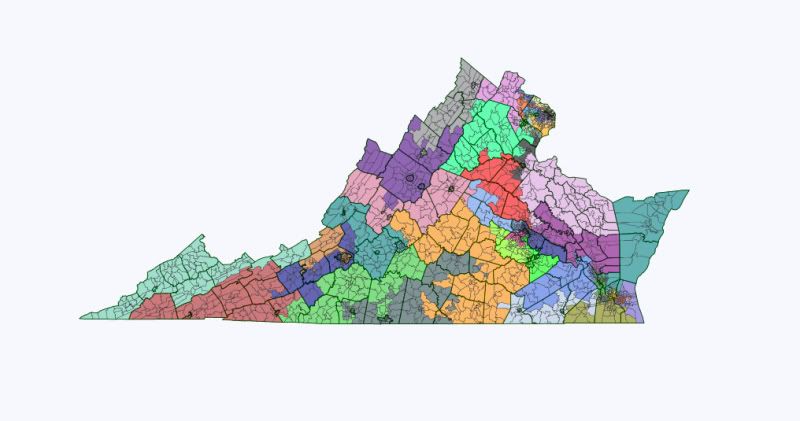
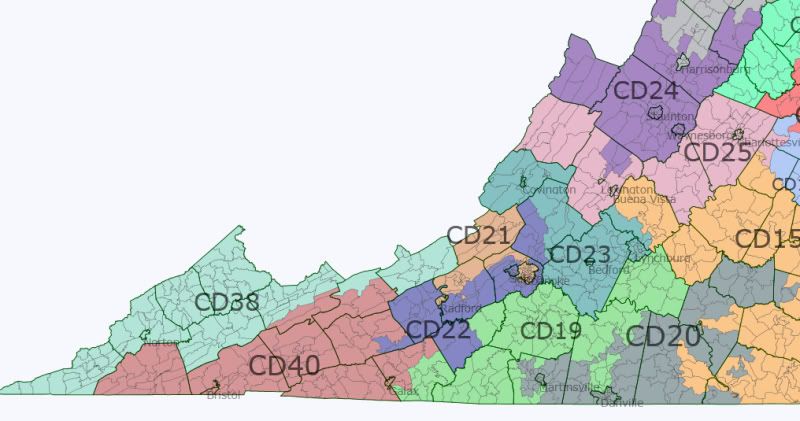
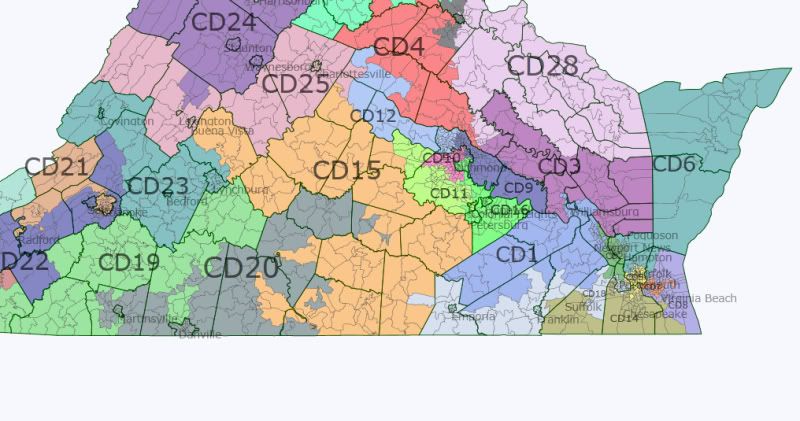
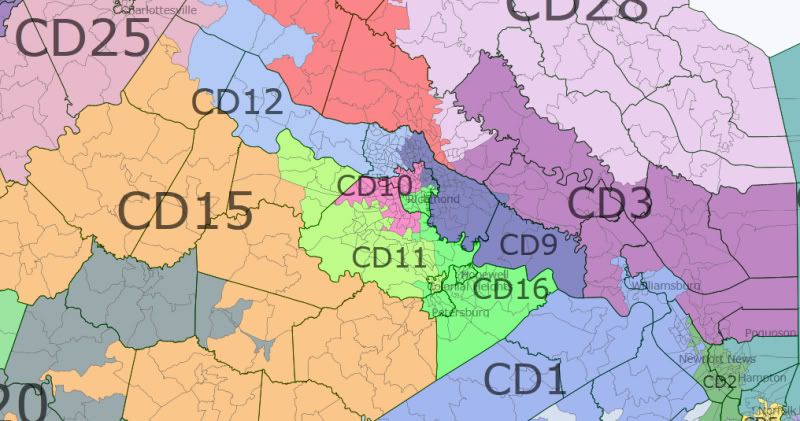
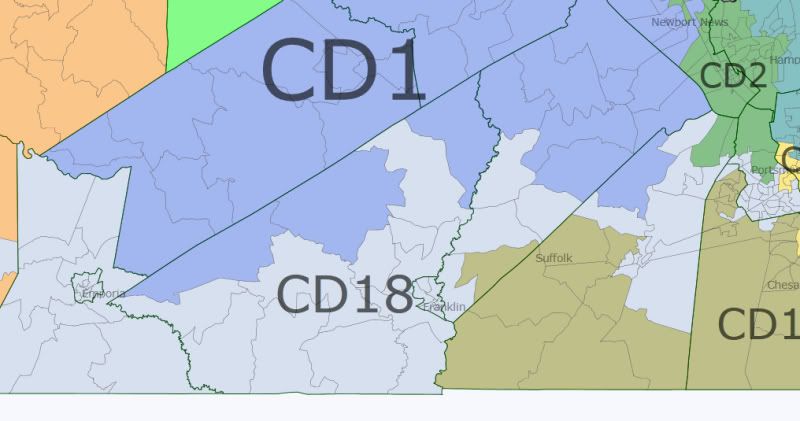
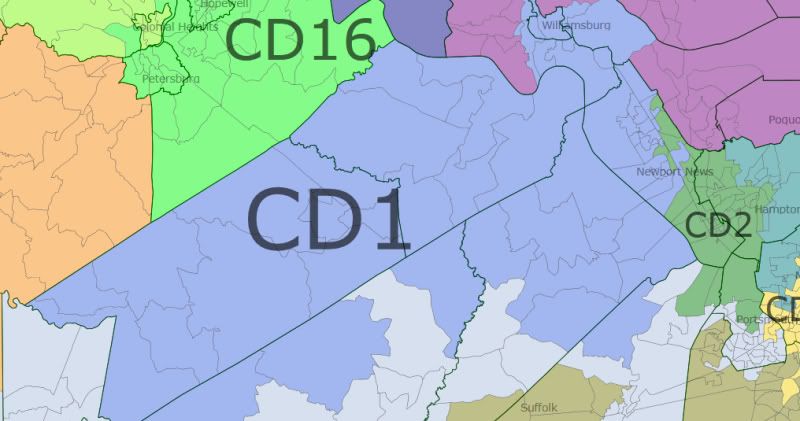
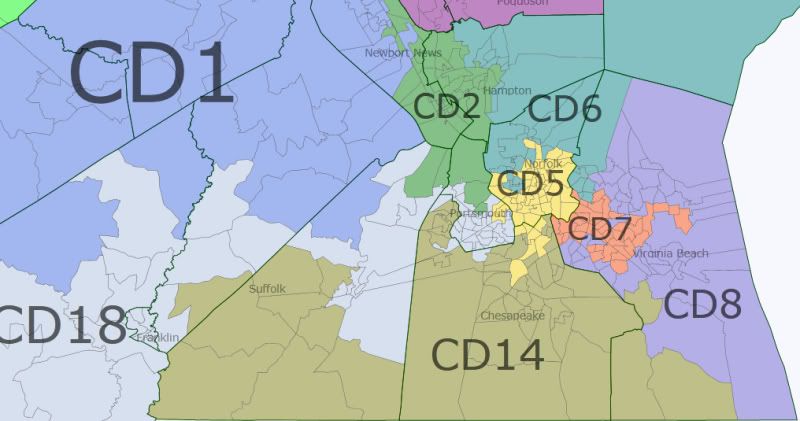
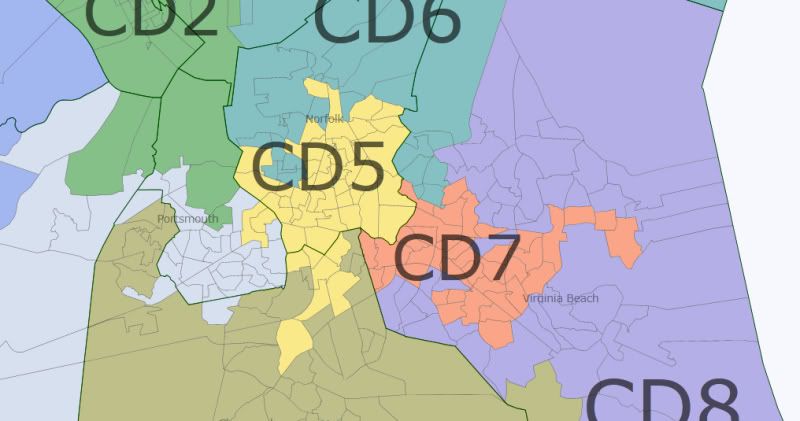
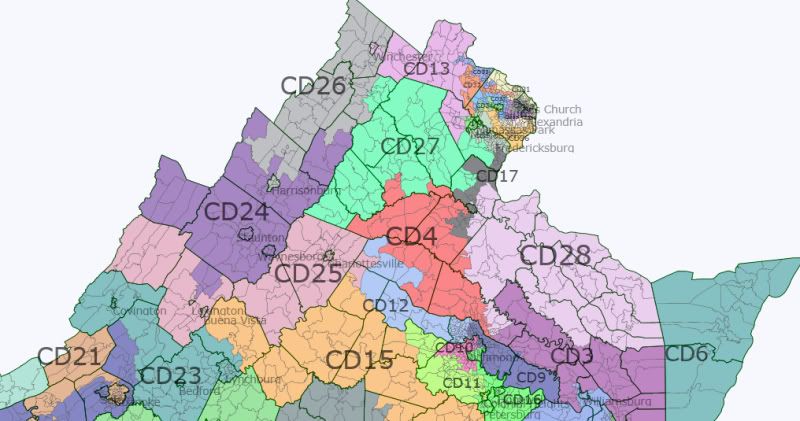
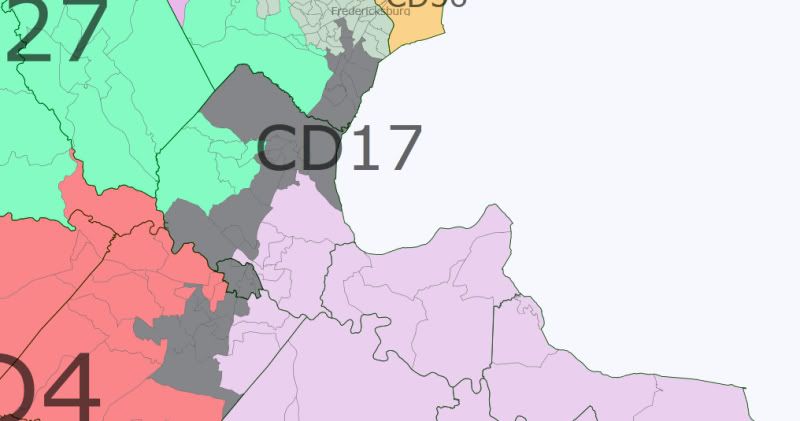
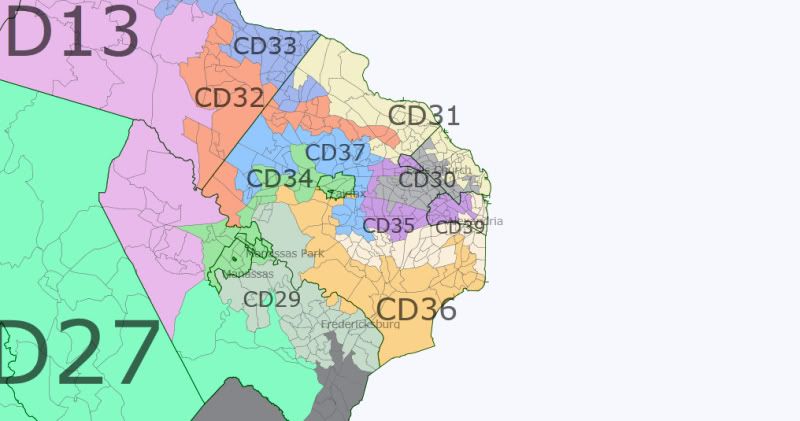
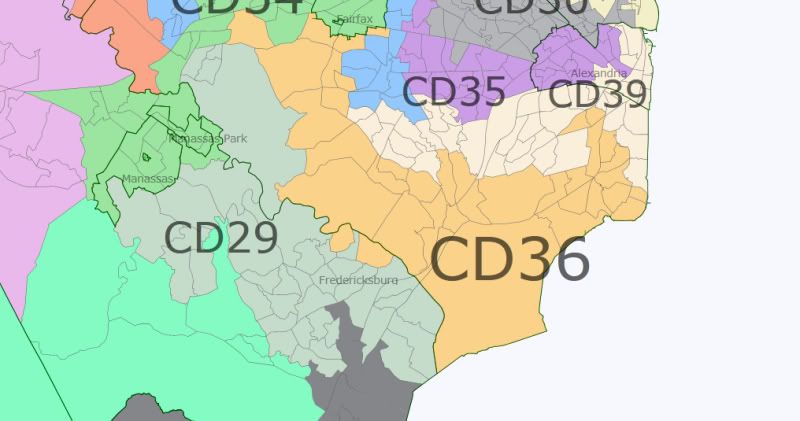
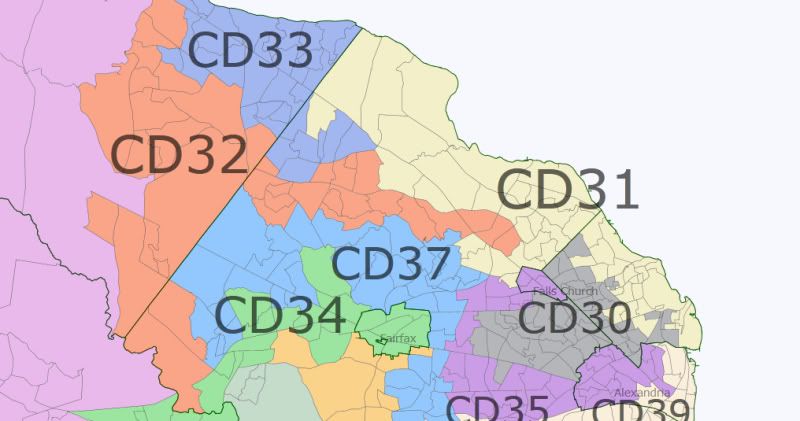
A few things I like-
Shoring up Roscoe in the 20nd. Although I disagree that he’s not too far to the right, I think that this is a good seat for the Democrats once he retires. Whoever wins it would be set up to try to take back the 5th later this decade. Even with a Republican gerrymandering the 5th will be competitive under some circumstances and it would be nice to expand the bench in the area.
Same with the 7th in Virginia Beach. It opens the door for a Democrat in the state legislature to use as a base for future run for office.
Your 15th could become competitive long term and in an open seat, potentially.
The way you draw the 1st makes sense and is a possibility. I’ve heard discussions of the Democrats either eliminating Quayle entirely or trying to make his district more Democratic to knock him off. Making Miller safer sounds like a better route.
I don’t know exactly how you changed the 28th but it was competitive in 2007 under some very ideal circumstances and I can only hope it could be competitive again over the next ten years. But I doubt we’ll have Pollard running again.
Have you thought about a Republican gerrymandering of the House of Delegates?
Very good job. I so hope the VA Senate sees this or are working diligently on something similar.
Though I worry a bit that there are too many districts with Dem. averages in the very low 50s.
I’ve been doing similar maps myself, but entirely ignoring the incumbent Republicans–which is probably a mistake.
Is there any place that details where these incumbents live? I’m especially curious about NoVA, where the blue areas need to be spread out a bit more, like in this map or in the one I drew.